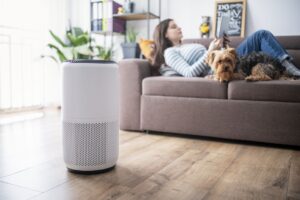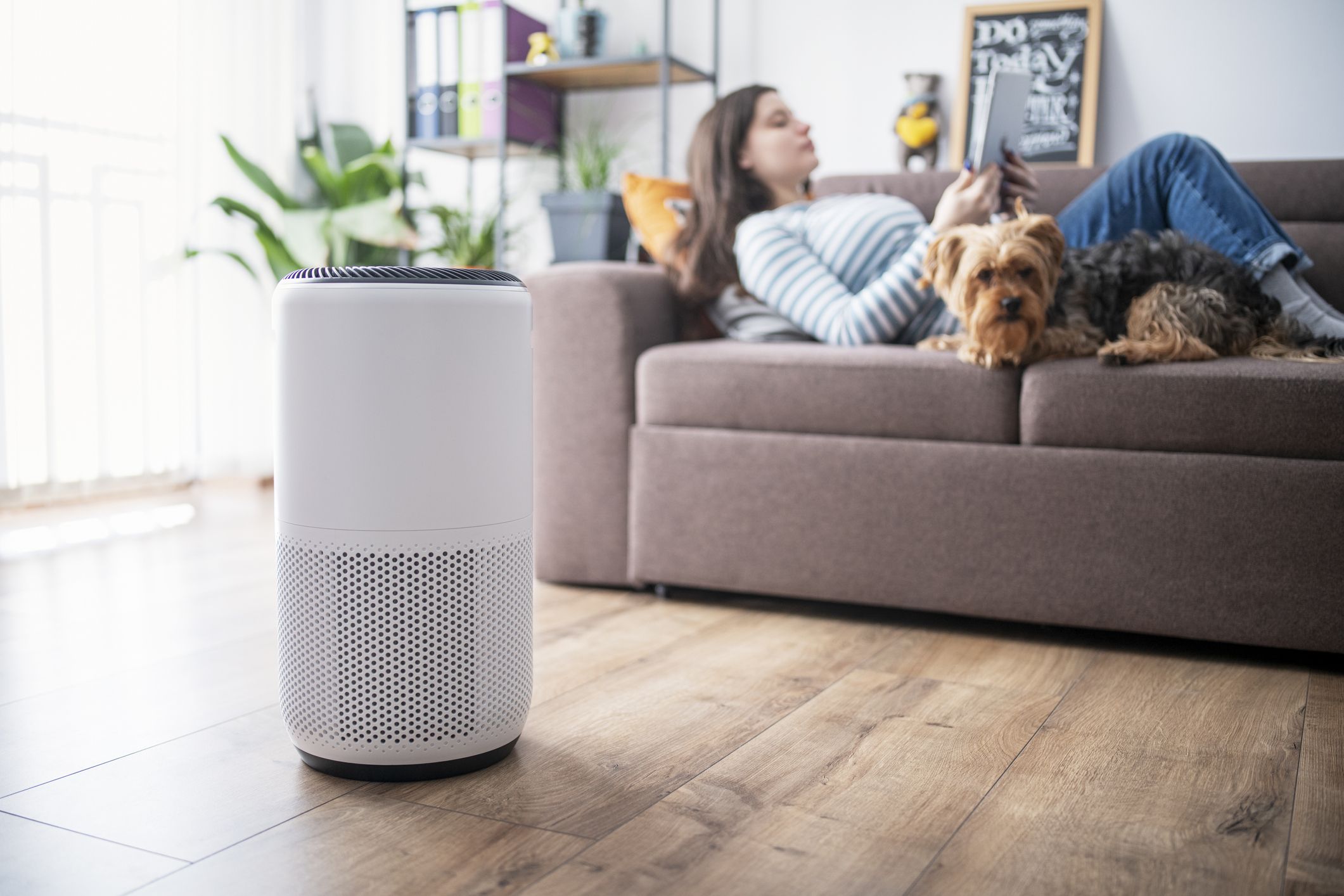When it comes to improving air quality in your living space, an air purifier for home can be a game-changer. Whether you’re battling dust, pollen, or pet dander, a good air purifier can help cleanse the air, making your home environment healthier and more comfortable. But with so many options out there, how do you choose the right air purifier for your living room? In this article, we’ll break down everything you need to know to make the right decision. By the end, you’ll be equipped with all the information you need to breathe easier.

Table of Contents
| Sr# | Headings |
|---|---|
| 1 | Why You Need an Air Purifier for Your Home |
| 2 | Types of Air Purifiers: What Works Best for Your Living Room? |
| 3 | How to Size an Air Purifier for Your Room |
| 4 | Key Features to Look for in an Air Purifier |
| 5 | Consider Your Specific Needs: Allergies, Pets, or Smoke? |
| 6 | Noise Level of Air Purifiers: Finding a Quiet Model |
| 7 | Filter Types: What’s Best for Your Air Quality Needs? |
| 8 | Energy Efficiency of Air Purifiers |
| 9 | Maintenance and Upkeep of Your Air Purifier |
| 10 | How Much Should You Expect to Spend on a Good Air Purifier? |
| 11 | The Importance of Proper Placement for Maximum Effectiveness |
| 12 | Top Air Purifiers for Home Living Rooms |
| 13 | Additional Tips for Maximizing Air Quality in Your Home |
| 14 | The Health Benefits of Clean Air |
| 15 | Conclusion: Making the Right Choice for Your Home |
Why You Need an Air Purifier for Your Home
Have you ever walked into your living room, only to feel that the air is heavy or stuffy? You’re not alone! Poor indoor air quality can have a significant impact on your health and overall comfort. Air purifiers help by removing common airborne pollutants such as dust, pollen, pet dander, mold spores, and even harmful chemicals like VOCs (volatile organic compounds). With more people spending time indoors, having a clean and fresh atmosphere is essential, especially in spaces like your living room where you relax and entertain guests.
The Benefits:
- Improved Respiratory Health: Clean air can help reduce symptoms for those with allergies or asthma.
- Odor Removal: Air purifiers can neutralize unpleasant odors from pets, cooking, or smoke.
- Better Sleep Quality: Cleaner air promotes better breathing, which can result in deeper, more restful sleep.
Types of Air Purifiers: What Works Best for Your Living Room?
Not all air purifiers are created equal. Depending on the size of your living room and the specific pollutants you want to target, the type of air purifier you choose will vary. Here’s an overview of the most common types:
HEPA Filters
High-Efficiency Particulate Air (HEPA) filters are among the most effective at trapping small particles like dust and pollen. They’re great if you have allergies or pets.
Activated Carbon Filters
These are great for neutralizing odors and chemicals. If your living room suffers from strong smells like smoke or cooking odors, an activated carbon filter might be the perfect choice.
UV Light Air Purifiers
These purifiers use ultraviolet light to kill bacteria, viruses, and mold spores. They’re best for germicidal purposes but may not filter out dust or allergens as effectively as HEPA filters.
Ionizers
Ionizers release charged particles into the air that attach to pollutants, causing them to fall to the ground. However, they can produce small amounts of ozone, which can be a concern for some people.
How to Size an Air Purifier for Your Room
Before purchasing an air purifier, you’ll need to make sure it’s the right size for your living room. An air purifier that’s too small will struggle to purify the air effectively, while one that’s too large might be an overkill.
Calculating Room Size
- Measure your living room’s square footage (length x width).
- Look at the air purifier’s recommended room size to ensure it matches.
Most air purifiers are rated by the square footage they can cover, so be sure to choose one that fits your room size.
Key Features to Look for in an Air Purifier
When browsing air purifiers, you’ll come across various features that can enhance your experience. Here are some important ones to consider:
Air Quality Sensors
Many modern air purifiers come with built-in sensors that detect the air quality in real-time. This feature can automatically adjust the purifier’s speed depending on the pollution levels in the room.
Smart Features
Some air purifiers offer Wi-Fi connectivity, allowing you to control them via smartphone apps or smart home devices like Alexa or Google Assistant.
Automatic Mode
This feature adjusts the purifier’s operation based on the level of pollution in the room, making it a hands-off option for busy individuals.
Consider Your Specific Needs: Allergies, Pets, or Smoke?
Your specific needs play a huge role in choosing the right air purifier. Consider these common factors:
- Allergies: If you suffer from seasonal allergies, choose an air purifier with a HEPA filter to trap pollen and other allergens.
- Pets: Pet dander can be a significant issue, so a high-performance HEPA filter or a purifier with an activated carbon filter will help.
- Smoking: If you live in a household with smokers, you’ll want an air purifier that effectively neutralizes smoke odors and particles.
Noise Level of Air Purifiers: Finding a Quiet Model
Nobody wants to deal with a noisy air purifier, especially in a living room where you may watch TV or entertain guests. Most models offer noise ratings measured in decibels (dB). A quieter air purifier generally falls below 50 dB.
Ideal Noise Range:
- Low Noise: 30-40 dB (similar to a soft whisper)
- Moderate Noise: 40-50 dB (like a quiet fan)
Look for air purifiers labeled as “whisper-quiet” if noise is a major concern for you.
Filter Types: What’s Best for Your Air Quality Needs?
Air purifiers use different types of filters, each suited for different needs. Here are the most common types:
HEPA Filters
Best for trapping small particles like dust, pet dander, and pollen.
Activated Carbon Filters
Ideal for removing odors, smoke, and harmful chemicals.
Pre-Filters
Pre-filters capture larger particles and extend the life of your primary filter.
UV Filters
Useful for sterilizing bacteria and viruses.
Energy Efficiency of Air Purifiers
Energy consumption is another important factor when choosing an air purifier. You want a model that can run continuously without spiking your energy bills. Look for units with an Energy Star label, which indicates the purifier meets energy efficiency standards.
Considerations:
- Power Consumption: Check the wattage.
- Airflow Efficiency: Ensure the purifier cleans the air effectively without using excessive power.
Maintenance and Upkeep of Your Air Purifier
To keep your air purifier running at peak performance, regular maintenance is required. This often involves changing filters, cleaning the unit, and checking for wear and tear.
Filter Replacement:
- HEPA Filters: Generally need replacing every 6-12 months.
- Activated Carbon Filters: Typically last 3-6 months.
- Pre-Filters: Should be cleaned every 2-4 weeks.
How Much Should You Expect to Spend on a Good Air Purifier?
Air purifiers vary in price, from budget models to high-end options. The cost is usually influenced by features, brand reputation, and performance capabilities. On average, you can expect to spend anywhere from $100 to $600 for a good-quality air purifier.
Budget Options: $100 – $200
Basic models that offer good filtration but may lack advanced features like Wi-Fi or air quality sensors.
Mid-Range Options: $200 – $400
These offer more features and better coverage for larger rooms.
High-End Models: $400 – $600
These tend to have the latest technologies, such as smart controls, large coverage, and multiple filtration layers.
The Importance of Proper Placement for Maximum Effectiveness
Even the best air purifier won’t work if it’s not placed correctly. To maximize the purifier’s effectiveness, keep it away from walls and corners where air can’t flow freely. Ideally, place it in the center of the room or near a source of pollution.
Top Air Purifiers for Home Living Rooms
Some air purifiers are designed specifically for living rooms, offering advanced features, high coverage, and a sleek design. Some of the top-rated models include:
- Coway AP-1512HH: A compact model with excellent filtration and energy efficiency.
- Levoit Core 300: Affordable, quiet, and highly effective for smaller spaces.
- Dyson Pure Cool: A premium option with smart features and large room coverage.
Additional Tips for Maximizing Air Quality in Your Home
In addition to using an air purifier, here are a few extra tips to ensure the air in your living room stays fresh:
- Keep windows open: When possible, ventilate your space to let fresh air in.
- Regular cleaning: Dusting, vacuuming, and washing fabrics help reduce airborne particles.
- Houseplants: Some plants can naturally purify the air.
The Health Benefits of Clean Air
Breathing clean air is essential for good health. Reducing pollutants like dust, pollen, and smoke can improve respiratory function, decrease allergy symptoms, and even enhance cognitive performance. Clean air can also boost your mood and overall well-being, making your living room a more enjoyable space.
Conclusion: Making the Right Choice for Your Home
Choosing the right air purifier for your home’s living room isn’t just about picking the first model you see. It’s about understanding your needs, the size of the space, and the features that will benefit you most. By considering all the factors mentioned in this guide, you can find an air purifier that will improve your home’s air quality and make your living space a healthier place to be. read more..
FAQs
1. What is the best type of air purifier for allergies?
A HEPA filter air purifier is typically the best choice for those with allergies as it efficiently traps small particles like pollen, dust, and pet dander.
2. How often do I need to replace the filters in my air purifier?
It depends on the type of filter. HEPA filters generally last 6-12 months, while activated carbon filters should be replaced every 3-6 months.
3. Can an air purifier eliminate pet odors?
Yes, an air purifier with an activated carbon filter is effective at neutralizing pet odors in the home.
4. Do air purifiers use a lot of electricity?
Most modern air purifiers are designed to be energy-efficient. Look for models with an Energy Star rating to ensure minimal power consumption.
5. Can I use an air purifier in a large living room?
Yes, but you’ll need to choose an air purifier with a larger coverage area. Check the room size specifications before purchasing.
